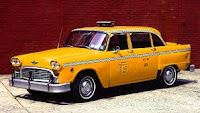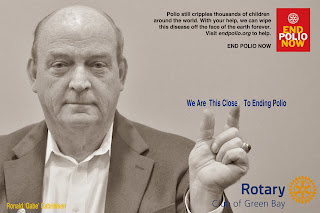President Truman was a different kind of President for three primary reasons:
First - and foremost, he was not elected to his first term of office; he inherited the position of President after the death of President Franklin Roosevelt.
Second - While serving as President of the United States, he chose to pay all of his travel and living expenses such as the food his family ate out of his Presidential salary.
Third - he placed a sign on his desk in the Oval Office which read - ‘The Buck Stops Here’
Ironically, President Truman probably made as many, if not more, important decisions regarding our nation as any as the other 32 Presidents who preceded him. Most notably on August 6th, 1945 he, and he alone, ordered the dropping of the 5 ton Atomic Bomb on the Japanese city of Hiroshima.
However, his true measure of greatness actually does not begin until after he left the White House in 1952.
After President - Elect Eisenhower was inaugurated into office as the new President of the United States, Harry and his wife Bess drove themselves back home to Independence Missouri in their personal automobile. There was no such thing as a Secret Service escort which followed them.
When they left Washington the only source of income they had was a small U.S. Army pension Harry earned and the only asset he and his wife Bess had to their name was a small house in Independence Missouri which Bess inherited from her parents. Other than the six years Harry and Bess spent in the White House, this was the only house the two of them ever knew during their entire married life.
Almost immediately upon returning to Missouri large corporations from across the county began to contact Harry Truman. They all wanted to offer his positions with huge salaries to come work for them. However Mr. Truman declined every offer he received saying "You don't want me, Gentlemen you want the office of the President, and that unfortunately doesn't belong to me. It belongs to the American people and I am sorry but that office is not for sale."
Several Congressmen soon noticed the former President was paying for all the stationary and the stamps he was using to respond to letters her received from US citizens and people around the world who wrote him. Not only that, President Truman personally licked every stamp he placed on an envelope. Congress voted to grant President Truman the very first 'Retired Presidential Allowance. The following year, Congress voted to give him a retroactive Presidential pension of $25,000 per year.
In May 1971, Congress was preparing a bill to award President Truman the Medal of Honor on his 87th birthday; however President Truman wrote a letter to Congress in which he stated he would refuse to accept any such medal. He said "I don't consider what I have done anything which should be the reason for any award, Congressional or otherwise – all I did was my job."
The one Truman quote I will personally never forget was the one he gave during an interview with the New York Times. When asked why he had gotten into politics in the first place he said "My choices in life were simple, either become a piano player in a Missouri whore house or enter politics. And to tell the truth, the way I saw it there was hardly any difference – so I choose politics."
Many Presidents and numerous political figures that followed President Truman found new levels of success by cashing in on their time in Public Office. Many used creative ways to accumulate untold wealth as a result of their time serving in public office.
It might be wise for us to take a moment now and then to remember President Harry Truman.
First - and foremost, he was not elected to his first term of office; he inherited the position of President after the death of President Franklin Roosevelt.
Second - While serving as President of the United States, he chose to pay all of his travel and living expenses such as the food his family ate out of his Presidential salary.
Third - he placed a sign on his desk in the Oval Office which read - ‘The Buck Stops Here’
Ironically, President Truman probably made as many, if not more, important decisions regarding our nation as any as the other 32 Presidents who preceded him. Most notably on August 6th, 1945 he, and he alone, ordered the dropping of the 5 ton Atomic Bomb on the Japanese city of Hiroshima.
However, his true measure of greatness actually does not begin until after he left the White House in 1952.
After President - Elect Eisenhower was inaugurated into office as the new President of the United States, Harry and his wife Bess drove themselves back home to Independence Missouri in their personal automobile. There was no such thing as a Secret Service escort which followed them.
When they left Washington the only source of income they had was a small U.S. Army pension Harry earned and the only asset he and his wife Bess had to their name was a small house in Independence Missouri which Bess inherited from her parents. Other than the six years Harry and Bess spent in the White House, this was the only house the two of them ever knew during their entire married life.
Almost immediately upon returning to Missouri large corporations from across the county began to contact Harry Truman. They all wanted to offer his positions with huge salaries to come work for them. However Mr. Truman declined every offer he received saying "You don't want me, Gentlemen you want the office of the President, and that unfortunately doesn't belong to me. It belongs to the American people and I am sorry but that office is not for sale."
Several Congressmen soon noticed the former President was paying for all the stationary and the stamps he was using to respond to letters her received from US citizens and people around the world who wrote him. Not only that, President Truman personally licked every stamp he placed on an envelope. Congress voted to grant President Truman the very first 'Retired Presidential Allowance. The following year, Congress voted to give him a retroactive Presidential pension of $25,000 per year.
In May 1971, Congress was preparing a bill to award President Truman the Medal of Honor on his 87th birthday; however President Truman wrote a letter to Congress in which he stated he would refuse to accept any such medal. He said "I don't consider what I have done anything which should be the reason for any award, Congressional or otherwise – all I did was my job."
The one Truman quote I will personally never forget was the one he gave during an interview with the New York Times. When asked why he had gotten into politics in the first place he said "My choices in life were simple, either become a piano player in a Missouri whore house or enter politics. And to tell the truth, the way I saw it there was hardly any difference – so I choose politics."
Many Presidents and numerous political figures that followed President Truman found new levels of success by cashing in on their time in Public Office. Many used creative ways to accumulate untold wealth as a result of their time serving in public office.
It might be wise for us to take a moment now and then to remember President Harry Truman.















